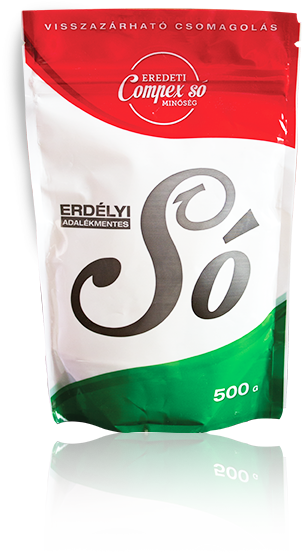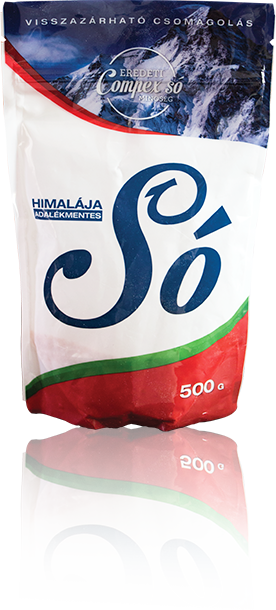Physiological effects
In an ordinary sense, the term "salt" is a solid substance formed by the bond of the positive sodium ion and the negative chloride ion. However, it is mostly known as a seasoning, in fact, the salt is an essential element of human organism. It has essential role in the regulation of blood circulation and fluid balance, it influences ongoing diffusive processes and cell formation of the organism, and stimulates digestion and metabolism. It facilitates to maintain body-fluids balance, it is crucial to the production of gastric acid, as well as to the transmission of nerve impulses.
Since our body does not produce salt individually, we should attend to its supplement. However, excessive salt consumption is just as harmful as salt-restricted diet. Approximately 125 grams of salt can provide basic life functions for an adult body. From this amount we lose salt regularly by sweating or by tears, therefore it is crucially important to intake the proper daily amount of salt to supply the loss. The human body needs 10-15 grams of salt a day.


Basic types
Salt products available in commerce can be categorized by production processes. The mined rock salt - table salt - products come to surface in the easiest way, from the fields of salt mines found under ground - where seas took place once - by simple stripping or blasting, basically in unchanged form. This includes the Himalayan salt products which are popular nowadays.
In case of the boiled, fine salts this procedure includes further processing steps. The final product comes into existence from the mined salt forming an aqueous solution. Then it is evaporated, thus purified and free of all kinds of pollution due to the procedure. However, exactly for the same reason it is available with a reduced content and in typical brightly white color. This procedure is an option for those salt mines where the quality of naturally extracted salt does not meet the requirements in its crude condition, because of some features like color or content.
In case of sea salts the final product will be distilled from the naturally salty water of seas without processing - similarly to the mined salt - consequently with higher mineral content.
Additives, Anti-caking agents
Due to the consumers' expectations, traded salt products contain additives in most cases. In recent decades a need has emerged according to which salts let be available in an easily usable form for the customers, without balling and solidification. To eliminate this, the mines extend the production process with the addition of anti-caking agent, which makes the final product retain its liquid condition for an unlimited time and helps the end use. The most frequent component for this purpose is Potassium ferrocyanide (E536).
Iodine
For the human body it is essential to intake the proper amount of iodine. Through the regulating operation of thyroid gland there can be several consequences of iodine deficiency. For this reason, special attention should be paid to its regular consumption. The salt is the most appropriate mineral to take into the body the proper quantity of iodine, because the daily intake can be well controlled by the salt. The eating salt contains 20-34 mg of iodine per kilogram. In Hungary it is crucially important to supply iodine, because most of the country is iodine deficient.
Our company offers traditional products enriched with anti-caking agents and 100% additive-free versions as well.
